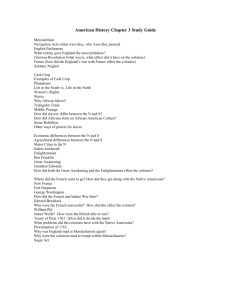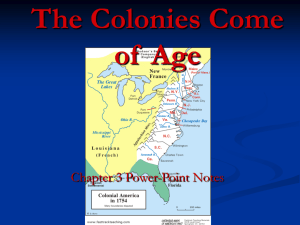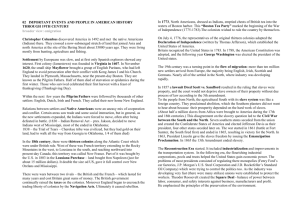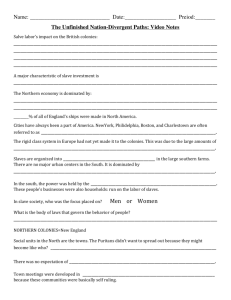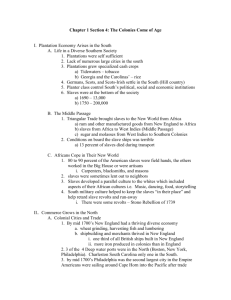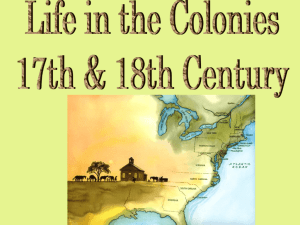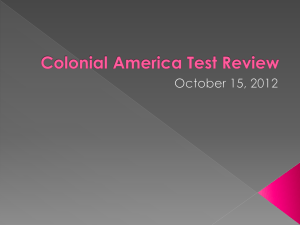Unit Exam Review Sheet, Foner, chapters 1
advertisement
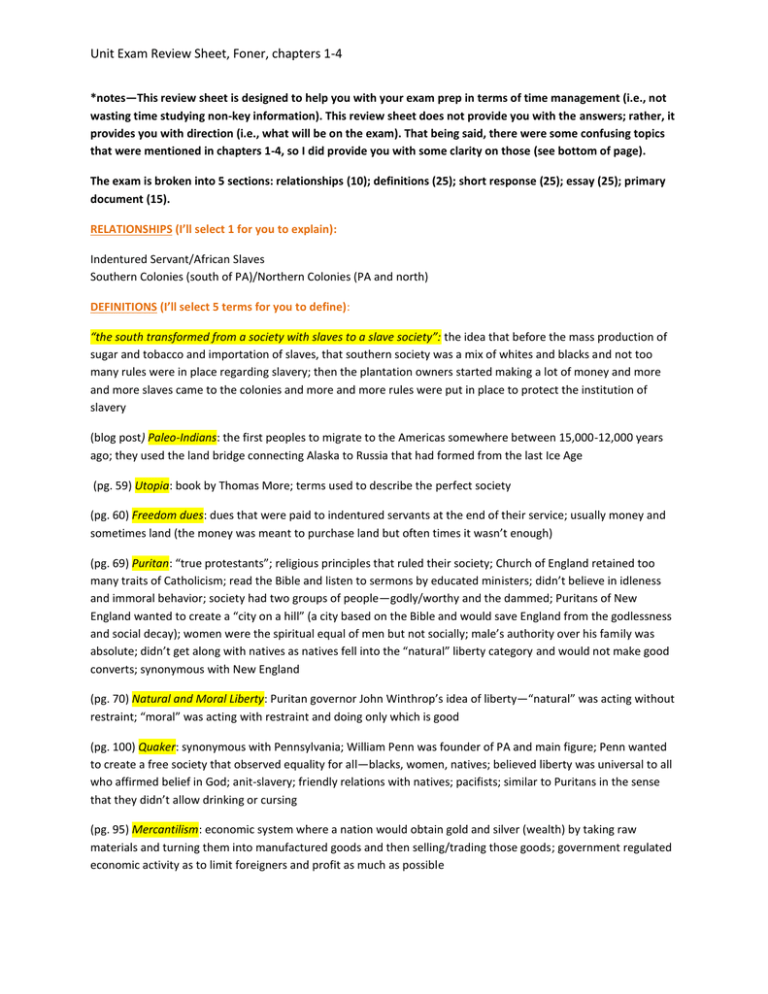
Unit Exam Review Sheet, Foner, chapters 1-4 *notes—This review sheet is designed to help you with your exam prep in terms of time management (i.e., not wasting time studying non-key information). This review sheet does not provide you with the answers; rather, it provides you with direction (i.e., what will be on the exam). That being said, there were some confusing topics that were mentioned in chapters 1-4, so I did provide you with some clarity on those (see bottom of page). The exam is broken into 5 sections: relationships (10); definitions (25); short response (25); essay (25); primary document (15). RELATIONSHIPS (I’ll select 1 for you to explain): Indentured Servant/African Slaves Southern Colonies (south of PA)/Northern Colonies (PA and north) DEFINITIONS (I’ll select 5 terms for you to define): “the south transformed from a society with slaves to a slave society”: the idea that before the mass production of sugar and tobacco and importation of slaves, that southern society was a mix of whites and blacks and not too many rules were in place regarding slavery; then the plantation owners started making a lot of money and more and more slaves came to the colonies and more and more rules were put in place to protect the institution of slavery (blog post) Paleo-Indians: the first peoples to migrate to the Americas somewhere between 15,000-12,000 years ago; they used the land bridge connecting Alaska to Russia that had formed from the last Ice Age (pg. 59) Utopia: book by Thomas More; terms used to describe the perfect society (pg. 60) Freedom dues: dues that were paid to indentured servants at the end of their service; usually money and sometimes land (the money was meant to purchase land but often times it wasn’t enough) (pg. 69) Puritan: “true protestants”; religious principles that ruled their society; Church of England retained too many traits of Catholicism; read the Bible and listen to sermons by educated ministers; didn’t believe in idleness and immoral behavior; society had two groups of people—godly/worthy and the dammed; Puritans of New England wanted to create a “city on a hill” (a city based on the Bible and would save England from the godlessness and social decay); women were the spiritual equal of men but not socially; male’s authority over his family was absolute; didn’t get along with natives as natives fell into the “natural” liberty category and would not make good converts; synonymous with New England (pg. 70) Natural and Moral Liberty: Puritan governor John Winthrop’s idea of liberty—“natural” was acting without restraint; “moral” was acting with restraint and doing only which is good (pg. 100) Quaker: synonymous with Pennsylvania; William Penn was founder of PA and main figure; Penn wanted to create a free society that observed equality for all—blacks, women, natives; believed liberty was universal to all who affirmed belief in God; anit-slavery; friendly relations with natives; pacifists; similar to Puritans in the sense that they didn’t allow drinking or cursing (pg. 95) Mercantilism: economic system where a nation would obtain gold and silver (wealth) by taking raw materials and turning them into manufactured goods and then selling/trading those goods; government regulated economic activity as to limit foreigners and profit as much as possible Unit Exam Review Sheet, Foner, chapters 1-4 (pg. 106) Bacon’s Rebellion: rebellion involving wealthy landowner Nathaniel Bacon and a group of slaves, indentured servants, landless men and the Virginia elite/governor William Berkeley; Virginia citizens were upset by the poor tobacco market, Berkeley only looking out for his rich friends, Berkeley raising taxes, and the fact that Berkeley was perceived to be protecting natives and their land; although Bacon and his men were eventually defeated the rebellion showed that slaves and non-slaves could come together and fight “the establishment” (this idea terrified the white elite) (pg. 122) Consumer Revolution: as trade increased, and mercantilism grew, more people had more money to buy the newly created manufactured goods; specialty shops were being created where you could purchase these newly created goods; newspapers were being filled with advertisements for British goods; loans were given out to businessmen; (pg. 125) Anglicinization: colonial elite becoming more and more English—they tried to model their lives on British etiquette and style—colonists wore English fashion, sent their kids to English schools, built homes that looked English, furnished their houses like the English. Triangular Trade: taking raw materials from the colonies to England, taking those materials and turning them into manufactured goods, taking those manufactured goods and trading them with Africa in exchange for slaves (or selling them back to the colonies), taking those slaves to the colonies (pg. 144) The Rice Kingdom: South Carolina’s staple crop; Carolina needed so many slaves that eventually slaves outnumbered whites; plantations were larger than other plantations because of the science that went into producing rice; slaves taught whites how to cultivate rice (pg. 160) American Enlightenment: period during the 18th century where ideas from the European enlightenment— reason, faith, politics, etc.—made their way over to the colonies; enlightened thinkers hoped that reason and not religion could govern human life; (pg. 161) The Great Awakening: religious revival that happened in various towns in the colonies in the 18 th century; some colonists became worried that worldly affairs were taking center stage over religion; religious people were trying to fight against enlightenment; the revivals threw into question not only religion but society as well; (pg. 170) Proclamation Line: an imaginary line that King George made running over the Appalachian Mountains that represented the line settlers could not cross; also marked the rule that only the crown could make land contracts with natives; this imaginary line bothered a lot of settlers adding another reason for the revolution (film) One Drop Rule: to be 100% white your blood had to have no other races in it (film) Haitian War of Independence: sugar plantations of Haiti are overtaken by slaves; slaves are able to fight off English and gain freedom SHORT ANSWER (I’ll select 5 topics from definitions or the ideas/terms below): racism; slave rules/laws; importance of reading and writing; middle passage PRIMARY DOCUMENT (you’ll be required to analyze this): Page 78 in Foner text. Unit Exam Review Sheet, Foner, chapters 1-4 CLARITY ON BIG THEMES: Motives for Colonization: 1. National power and glory—the nation with the largest territory has the potential to be more dominant 2. Financial—access to gold, silver, natural resources 3. Land—land was fairly limited in Europe/limited to the wealthy; the New World provided an opportunity for acquiring land 4. Religious freedom—certain religious groups were being persecuted in Europe; the New World provided them a place to practice English Freedom/liberty: Land, English settlers believed, was the basis of liberty; owning land gave men control over their own labor; owning land gave men the right to vote (which meant they had a say in how they were governed); the English document “the Magna Carta” (1215) laid the frameworks for freedoms/liberty—document listed certain “liberties” granted by the king to all freemen of the kingdom (e.g., protection against random imprisonment; security of private property; trial by jury); as time went on the idea of freedom/liberty changed to encompass greater freedoms (e.g., freedom of speech) How does this factor into the Revolutionary War? More and more people in the colonies felt that they were in fact not truly “free” because of their relationship with the Crown/certain things the Crown was doing to the colonies (e.g., taxing). The idea of “freedom” and “liberty” would become one of the rallying cried when the colonists eventually declare they independence from Britain. Colonial Economy: New England—most settlers were fairly well off, unlike the settlers of the southern colonies, and were skilled farmers, weavers and tailors; most settlers came over for religious or economic purposes and were able to pay their own way (i.e., no need for indentured servants); timber and fish were their main exports; family run small farms; basis of the economy eventually became trade—trading with England, southern colonies, West Indies; by the 1640s New England repealed many economic regulations (e.g., wage earning and prices for goods were set) and this made even more people more wealthy; Puritan religion was very dominant here Maryland South Carolina and Virginia—most settlers were single men; most people came over as indentured servants; tobacco and rice was the basis of their economy; the need for manual labor helped create the plantation system—large plot of land that produced some staple crop (e.g., tobacco, sugar, cotton) that was overseen by a person or family; economy was based on slave labor; very wealthy elite began to grow due to profits from tobacco and rice; large discrepancy between “have and have nots” How does this factor into the Revolutionary War? It doesn’t really, other than the fact that one could argue that more loyalists lived in the south (loyalist = someone who is loyal to the Crown) and that the fighting started in the north. The differences in economies really come into play after the Revolution and more so leading up to the Civil War. Colonial politics: White landowning men were allowed to vote; the rich white elite stayed out of touch with the people they represented; governors and councils were appointed by the crown; laws that were passed by assemblies could be Unit Exam Review Sheet, Foner, chapters 1-4 vetoed by the governors or the crown; high ranking positions were often times appointed by the governor; qualifications for holding office were more difficult than voting (e.g., large land plot, payment, total wealth); the idea of “my vote doesn’t count” is spawned during early politics in the colonies as the “common man” is on the outside looking in (the rich white elite are on the inside); as time went on (mid/late 18 th century) the crown became less involved with politics in the colonies (due to domestic issues) and a system of the local governor working with the colonial elite became more rampant How does this factor into the Revolutionary War? Leading up to the war more and colonists saw that their voice was not truly being heard in politics because ultimately the governor and Crown had the final say. The colonists did not agree with certain policies being implemented and felt they had no way of changing policy. The 7 Years’ War: A small war that was a part of a larger war—took place in the colonies between the English, French and Indians (while a bigger war between the English, Spanish, French and Russians was going on in Europe); the fighting started when the English tried to push the French out of western PA; the French teamed up with the natives (as did the English) and the two sides began to fight; the English would eventually defeat the French and gain control of Florida, the western frontier and Canada How does this factor into the Revolutionary War? The British were fighting many wars well before the 7 Years’ War and to help pay for all the wars they needed to tax their citizens—this was especially true after the “French and Indian War”. England turned to the colonies to help pay off its war debt, and this became a huge problem for the colonists. Colonists would also become very angry by the fact they couldn’t move west and gain access to land. The outcome of the 7 Years’ War would also come into play during the Revolution as the French would aid the colonists in their fight against the British.
